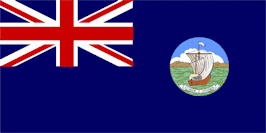Grenada Volunteer Force
 The 1982 Encyclopedia of the Third World stated that "Grenada has no standing army" and that the United Kingdom was responsible for the defense of the island.
The 1982 Encyclopedia of the Third World stated that "Grenada has no standing army" and that the United Kingdom was responsible for the defense of the island.
The first Grenada Volunteer Force was raised in 1878, and disbanded June 1881. In 1886 the House of Lords authorized the issue of 100 snider rifles, accoutrements, &c. allowed, on the disbandment of the Grenada volunteer force to whom they were originally issued.
On 26 September 1910, a public meeting was held at York House to consider the formation of a Volunteer Reserve Force in the parish of St. George’s. His Excellency the Governor presided. The meeting resulted in the appointment of a Committee to further consider the raising of a Volunteer Reserve Force. The Committee held its first meeting on 03 October, 1910, when the Chief Justice was elected Chairman, and it recommended that a Volunteer Force was preferable to a Volunteer Reserve Force. The Government should grant a sum of £250 for 1911, for the purpose of equipping, clothing, and providing ammunition for a body of 50 men, which body should be increased to 100 when opportunity offered. David L. Slinger received a commission from His Excellency as Captain of the Corps dated 25 February, 1911, and 50 men were sworn in by him for a period of 3 years certain on 02 March 1911.
Grenada Volunteer Corps, the formation of which was authorised in 1911, is constituted under Volunteer Ordinance No. 7 of 1900. The Force consisted of one company of Infantry, with an establishment of 5 officers and 100 other ranks, armed with M.L.E. rifles, and was liable for military service within the Colony only. When on active service, members become subject to the Army Act as far as is consistent with the provisions of the above Ordinance. Men, who enlisted for three years, were all West Indian born. Headquarters were at St. George's. To qualify as efficient, members were required annually to attend twelve drills (recruits 30) and all inspections, complete a course of musketry, and take part in the annual training The musketry course consisted of trained men, 100 rounds, and, in addition, 30 rounds for each man who is efficient ; recruits, 80 rounds, ranges 100 to 500 yards.
The Grenada Police Force was constituted under Ordinance No. 32 of 1896, and, under Ordinance No. 2 of 1913, was liable to be called on for military service. Headquarters of the Force, which had an establishment of 1 officer and 110 men armed with M.L.E. rifles, are at St. George's, where 1 officer and 66 other ranks are stationed; the remainder are distributed among nine out-stations. The Chief of Police and sergeant-major were Europeans. Men are West Indian born. Members enrolled for two years.
Early in 1939, in anticipation of War, the Grenada Volunteer Force and Reserve, which had remained active in the years between the wars, was amalgamated with the Police Force and put under one Commanding Officer as the Grenada Defence Force. As soon as War was declared, it was the immediate job of the Grenada Defence Force was man vulnerable points in accordance with the Defence Scheme for the island. The Grenada Volunteer Reserve was also formed, and the men given some military training and equipped with uniforms and rifles. In 1944, the Southern Caribbean Force was formed, under the command of both English and Caribbean Officers.
The 8th of May 1945, was 'V.E. Day" (Victory in Europe) for Grenada as it was for the rest of the Allied countries. The news was celebrated with spontaneous rejoicing, and the streets were filled with music, dancing and Carnival-like parades and celebration. More rejoicing took place on "V.J. Day", on 14th August, marking the Allied victory over Japan. The Government set about dismantling the arrangements put in place for the War, and soon the soldiers came home. Many were offered positions in the police force, prisons or civil service. Some had had their positions kept open for them. Others went away to study, or were otherwise absorbed into the work force.
A subsequent Grenada Volunteer Force was active from 1974 to 1979. Since Grenada became an Associated State in 1967 the Grenada Government have been solely responsible for internal affairs and the British Government have had no right or authority to intervene. UK defence responsibilities lay not with the maintenance of internal law and order but with defence against external aggression. The West Indies Act 1967 gave full internal self-government to a number of our dependencies in the West Indies, while Her Majesty's Government retained responsibility only for external affairs and defence. The Associated States, as these dependencies became known, were given the power to terminate this relationship unilaterally, which Grenada did in 1974.
|
NEWSLETTER
|
| Join the GlobalSecurity.org mailing list |
|
|
|

